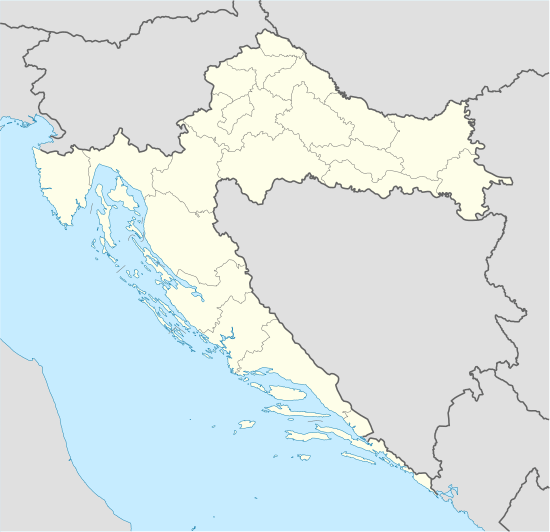Gajine, Croatia
Gajine (Serbian Cyrillic: Гајине)[1] is a village in Croatia.
Gajine | |
|---|---|
Village | |
 Gajine | |
| Coordinates: 44°32′39″N 15°59′01″E | |
| Country | |
| County | Lika-Senj County |
| Municipality | Donji Lapac |
| Elevation | 629 m (2,064 ft) |
| Population (2011) | |
| • Total | 116 |
| Time zone | UTC+1 (CET) |
| • Summer (DST) | UTC+2 (CEST) |
| Postal code | 53250 Donji Lapac |
| Area code(s) | +385 (53) |
Population
According to the 2011 census, Gajine had 116 inhabitants.[2]
| Population[3] | |||||||||||||||
|---|---|---|---|---|---|---|---|---|---|---|---|---|---|---|---|
| 1857 | 1869 | 1880 | 1890 | 1900 | 1910 | 1921 | 1931 | 1948 | 1953 | 1961 | 1971 | 1981 | 1991 | 2001 | 2011 |
| 0 | 0 | 0 | 643 | 783 | 772 | 786 | 991 | 378 | 378 | 365 | 353 | 169 | 224 | 71 | 116 |
Note: From 1857- 1880 data is included in the settlement of Donji Lapac. In 2001 part of the settlement (hamlet), by name Boričevac, became an independent settlement.
1991 census
According to the 1991 census, the settlement of Gajine had 257 inhabitants, who were ethnically described as follows:
| Gajine |
|---|
| 1991 |
Note: Together with settlement of Boričevac.
Austro-Hungarian 1910 census
According to the 1910 census, the settlement of Gajine had 772 inhabitants in 6 hamlets, who were linguistically and religiously described as follows:
| Population by language | Croatian or Serbian |
|---|---|
| Gajine | 260 |
| Kosić-draga | 41 |
| Lapački Obljaj | 111 |
| Malta | 76 |
| Podlisac | 173 |
| Varošine | 111 |
| Total | 772 (100%) |
| Population by religion | Eastern Orthodox | Roman Catholics |
|---|---|---|
| Gajine | 260 | - |
| Kosić-draga | 41 | - |
| Lapački Obljaj | 111 | - |
| Malta | 68 | 8 |
| Podlisac | 43 | 130 |
| Varošine | 99 | 12 |
| Total | 622 (80.56%) | 150 (19.43%) |
Literature
- Savezni zavod za statistiku i evidenciju FNRJ i SFRJ, popis stanovništva 1948, 1953, 1961, 1971, 1981. i 1991. godine.
- Knjiga: "Narodnosni i vjerski sastav stanovništva Hrvatske, 1880-1991: po naseljima, autor: Jakov Gelo, izdavač: Državni zavod za statistiku Republike Hrvatske, 1998., ISBN 953-6667-07-X, ISBN 978-953-6667-07-9;
gollark: The main issue is that the dictator does not have much of an incentive to be good once they're in power. At least in modern democracies you have a *bit*.
gollark: And that would probably result in the testing authority being de facto ruler.
gollark: You can't, I think, test in a way which could not be faked by a not-good dictator.
gollark: Great!
gollark: The issues of picking an initial dictator, and passing it on to the next person, will run into similar issues to modern democracy: you're optimizing for someone who's convincing and sounds good and not necessarily someone who *is*.
References
- Government of Croatia (October 2013). "Peto izvješće Republike Hrvatske o primjeni Europske povelje o regionalnim ili manjinskim jezicima" (PDF) (in Croatian). Council of Europe. p. 36. Retrieved 30 November 2016.
- "Population by Age and Sex, by Settlements, 2011 Census: Gajine". Census of Population, Households and Dwellings 2011. Zagreb: Croatian Bureau of Statistics. December 2012.
- - Republika Hrvatska - Državni zavod za statistiku: Naselja i stanovništvo Republike Hrvatske 1857.-2001.
This article is issued from Wikipedia. The text is licensed under Creative Commons - Attribution - Sharealike. Additional terms may apply for the media files.